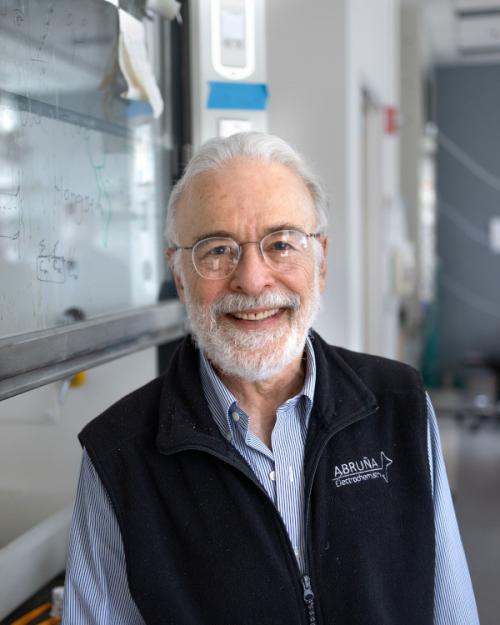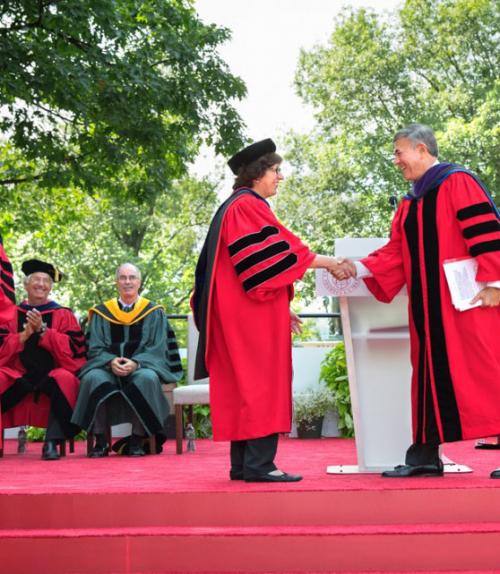Martha E. Pollack plumbed the depths of Cornell history and spoke to current times in her inaugural address Aug. 25, following her installation as the university’s 14th president.
Quoting a speech written during the dark days of World War II by Cornell historian Carl Becker, Pollack said there is just as much need today for universities to “maintain and promote the humane and rational values” that preserve democratic society.
“Today, it is just as important as it was in 1940 to roundly reject bigotry, hatred and fascism,” she said to applause. “Today, it is just as essential to stand firmly on the side of democracy, human dignity and the well-being of the many.”
Sunny weather and a cool breeze cooperated for the ceremony, held on the Arts Quad.
University Marshal Charles Walcott led the formal procession from Ho Plaza to music by the Cornell University Wind Symphony. The procession included university trustees and leadership; faculty, staff and students; and delegates from more than 80 universities and institutions.
Cayuga Nation Subchief and Faithkeeper Karl Hill opened the ceremony with a traditional speech of thanksgiving in the Cayuga language, and an English translation. It was the first time the blessing was recited during an inauguration at Cornell, whose Ithaca campus lies within the traditional Cayuga Nation territory.
Chairman of the Cornell Board of Trustees Robert S. Harrison ’76 presided over the ceremonies. He greeted the audience, which included all four living previous Cornell presidents, and noted the absence of the late president Elizabeth Garrett.
Harrison also welcomed Dartmouth University President Philip Hanlon, Pollack’s longtime mentor and colleague. When Hanlon was promoted at the University of Michigan from vice provost to provost, Pollack succeeded him as vice provost. And when Hanlon became president of Dartmouth, Pollack succeeded him as provost at Michigan.
“I can say with complete confidence that – effective today – the entire Cornell community will do everything in its power to prevent a continuation of this pattern,” Harrison quipped.
At Michigan, Pollack stood out for attributes that made her destined for this presidency, Hanlon said: genuine concern for people, an unusual clarity of vision for the future and a commitment to truth.
In seeking the truth, we must not be swayed by what we expect or hope to see or lean toward conclusions that serve our self-interest, he said. “… We must be ever vigilant in defending this foundation of the academy,” he said. “And I can tell you, with certainty, that you have chosen a leader who will do exactly that. Martha possesses this habit of mind, and applies it to every decision she makes.”
Ishion Hutchinson, the inaugural poet and an assistant professor in the Department of English, offered a reading of his poem, “Singing School Valediction.”
Harrison followed, saying Pollack possessed the exact experience and qualities the Presidential Search Committee had sought. She is a bold and inspirational leader who values shared governance, he said. She is a scholar who appreciates the sciences and the humanities and can forcefully advocate for both. And she has been a successful administrator of a large and complex institution.
“Martha Pollack has that rare mix of academic achievement, practical experience, scientific curiosity, total unpretentiousness and extraordinary interpersonal skills to lead Cornell into the future,” Harrison said.
He invited Pollack to the stage for the investiture ceremony, presenting her with the university charter, seal and mace. The audience cheered their approval.
“Today, I stand humbled, committed and ready to take on the noble work of this university, along with you, the Cornell community,” Pollack said. “Together we will sustain and enhance Cornell’s academic distinction, we will ensure a culture of educational verve, and we will do the difficult but essential work needed to fulfill our civic responsibilities.”
Cornell has a particularly strong appreciation for its history, she noted. More than at other universities, the Cornell community knows the story of its founders and their vision that the university would be open to any student, not restricted by gender, race, religion or nationality.
On the 75th anniversary of Cornell’s founding, Becker, the historian, said the purpose of Cornell – and any university – is “to maintain and promote the humane and rational values which are essential to the preservation of democratic society, and of civilization as we understand it.”
Universities meet those obligations in three ways: through the pursuit of scholarship, education of the next generation and fulfillment of civic responsibilities, Pollack said.
She went on to paint a picture of how Cornell must fulfill those obligations.
Regarding the first responsibility – academic distinction – Pollack said Cornell will invest in faculty and provide an environment in which they thrive, as teachers and researchers. Cornell will also build on what makes it intellectually distinctive. That includes the breadth of its research, its status as both an Ivy League and land-grant university, and its Cornell Tech campus in New York City.
“Extraordinary opportunities” will come from Cornell Tech, she said. “Just as we have a long tradition of recognizing and building on the complementary strengths of the liberal arts and the applied fields of study … so too will we combine and benefit from the synergistic advantages of our rural and our urban campuses. ‘One Cornell’ we shall be, and we shall be stronger and more distinguished because of it.”
The second path for maintaining and promoting humane and rational values is education, she said. Arguably, it is by educating students that Cornell best promotes those values.
That’s where Cornell must aspire to what Pollack called “educational verve.” “If you, like me, are an avid solver of the Sunday New York Times crossword puzzle, you’ll recognize ‘verve’ as a periodic entry, typically clueing answers of ‘élan,’ ‘zest,’ ‘vim,’ ‘brio’ and ‘gusto,’” she said. “This is what we must aspire to in education: a vitality that leads our students to a lifetime of discovery, a passion for ideas and a commitment to seeking truth.”
The third path to humane and rational values lies in three intertwined civic responsibilities, she said: to stand up for knowledge and truth, protect freedom of speech, and create a Cornell community that is diverse, inclusive and egalitarian.
Daniel Patrick Moynihan, the late United States senator from New York, famously said that everyone is entitled to their own opinion, but not to their own facts, she noted, to the audience’s applause. But in the past decade society has become “sloppy in assessing information, too frequently content to conclude that something is true – or false – on the basis of hearsay, without rigorous examination of evidence,” she said.
This is a dangerous trend, and it threatens the coherence of our democracy, she said.
“As an institution committed to the value of knowing what is true, we at Cornell must forcefully and publicly defend the notions of evidence, reason, and yes, truth itself,” Pollack said, “and we must be intentional in providing both our students and the public the tools needed to assess information and determine the reliability of it.”
Cornell’s second civic responsibility is to protect freedom of speech – a concept embedded in its mission, Pollack said.
“While there are those who may promulgate messages that we collectively and institutionally abhor, we cannot allow them to push us into curtailing the rights that we cherish,” she said. “Instead, it is our duty to use those rights to identify and confront evil, to educate and to vigorously support, empower and defend the dignity of those who are targeted by abhorrent speech.”
Cornell’s third civic responsibility – to create a diverse, inclusive and egalitarian community – is found in its identity as a university for “any person.” Yet Cornell must not ignore that it has not always been successful at realizing that value, and that it is part of a society in which discrimination and hatred still have sway, she said.
She concluded her address as she began it: with a reference to Cornell’s early history and its founders’ commitment to equality.
A.D. White was asked in 1874 whether the university welcomed black students. White’s response was clear. He wrote: “If even one offered himself and passed the examinations, we should receive him, even if all our 500 students were to ask for dismissal on that account.”
“This is the essence of Cornell: a university bold in its ideals and fervent in its commitment to them,” Pollack said.
“Together, we will take satisfaction in doing what universities like ours were created for: promoting humane and rational values, and thereby not simply preserving but also enriching democratic society, intellectually and morally.”
The ceremony also included readings from prior Cornell inaugurations by undergraduate student Jaylexia Clark ’19, graduate student Aravind Natarajan, Ph.D. ’18, staff member Evelyn Ambriz ’11, MPA ’15, and Charles Van Loan, dean of the university faculty. The Cornell University Glee Club and Chorus performed.
This story also appeared in the Cornell Chronicle




